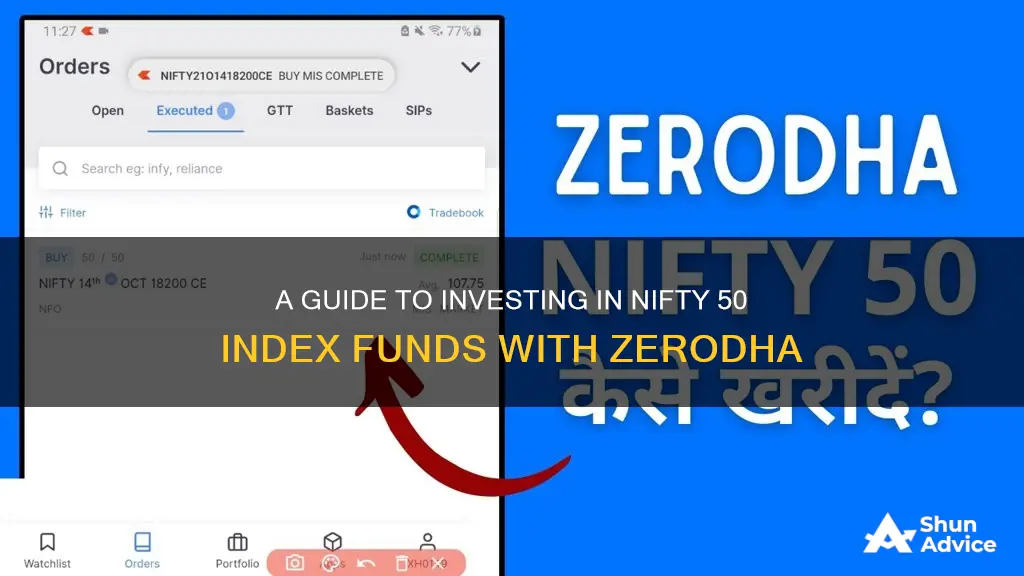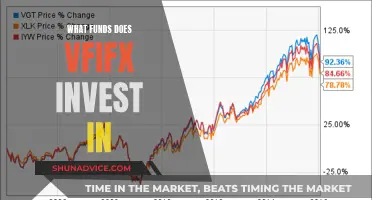
NIFTY 50 is an index consisting of India's top 50 large-cap companies across 13 sectors, actively traded on the National Stock Exchange (NSE). It is used as a benchmark for many mutual fund schemes and investors' portfolios. One can invest in NIFTY 50 via index funds or exchange-traded funds (ETFs). There are two ways to invest in NIFTY 50: buying stocks directly in the same percentage as their weightage in NIFTY 50 or investing in index mutual funds that track NIFTY 50. Zerodha, a popular investment platform in India, offers both ETF and mutual fund routes to invest in NIFTY 50. This article will provide a step-by-step guide on how to invest in NIFTY 50 using Zerodha and discuss the benefits and considerations of investing in this index.
| Characteristics | Values |
|---|---|
| What is NIFTY 50? | An index of the National Stock Exchange (NSE) comprising the top 50 companies of India by market capitalisation. |
| How is NIFTY 50 Calculated? | The value of NIFTY 50 is calculated using the free float market capitalisation method. The current market cap of all the stocks that are part of NIFTY 50 is divided by the Market Cap of the base period. |
| NIFTY 50 Constituents | Adani Ports and Special Economic Zone Ltd, Kotak Mahindra Bank Ltd, Larsen & Toubro Ltd, Mahindra & Mahindra Ltd, Bharat Petroleum Corporation Ltd, Maruti Suzuki India Ltd, Britannia Industries Ltd, Oil & Natural Gas Corporation Ltd, Power Grid Corporation of India Ltd, Divi’s Laboratories Ltd, Reliance Industries Ltd, Dr. Reddy’s Laboratories Ltd, SBI Life Insurance Company Ltd, Grasim Industries Ltd, HCL Technologies Ltd, Sun Pharmaceutical Industries Ltd, Tata Consultancy Services Ltd, HDFC Life Insurance Company Ltd, Tata Consumer Products Ltd, Hindalco Industries Ltd, Hindustan Unilever Ltd, Housing Development Finance Corporation Ltd, UltraTech Cement Ltd, Indian Oil Corporation Ltd |
| How to Invest in NIFTY 50? | There are two ways to invest in NIFTY 50: 1) Buy stocks directly in the same percentage as their weightage in NIFTY 50 2) Invest in Index Mutual Funds that track NIFTY 50 |
| Benefits of Investing in NIFTY 50 Index Funds | Low Investment Amount, Investment Flexibility, Low-Cost Investment, No Need To Worry About Rebalancing, No Bias In Investing |
| How to Invest in NIFTY 50 via Zerodha? | There are two avenues to invest in NIFTY 50 on Zerodha: 1) ETFs (Exchange-traded funds) 2) Mutual funds tracking the Nifty 50 index |
What You'll Learn
- Nifty 50 ETFs: Exposure to 50 stocks that form the index
- Nifty 50 Index Funds: Low-cost investment with no active buying/selling
- Nifty 50 Stocks: Directly invest in the same percentage as their weightage
- Nifty 50 Derivatives: Futures and Options contracts to speculate on future performance
- Nifty 50 Mutual Funds: Pooled investment vehicle with a fund manager

Nifty 50 ETFs: Exposure to 50 stocks that form the index
Nifty 50 ETFs are Exchange Traded Funds (ETFs) that track the performance of the Nifty 50 Index, which consists of India's top 50 large-cap companies across 13 sectors. When you invest in a Nifty 50 ETF, you gain exposure to all 50 stocks that form the index.
ETFs are baskets of securities that are designed to mirror the composition of an underlying index. In the case of Nifty 50 ETFs, they aim to replicate the performance of the Nifty 50 Index by holding the same 50 stocks in the same proportions. This means that by investing in a Nifty 50 ETF, you essentially become a part-owner of these 50 leading Indian companies.
The Nifty 50 Index includes well-known companies such as Adani Ports, Kotak Mahindra Bank, Larsen & Toubro, Mahindra & Mahindra, and Bharat Petroleum Corporation, among others. These companies are leaders in their respective sectors and are among the biggest and most reputed in India.
Investing in a Nifty 50 ETF offers several benefits. Firstly, it provides broad exposure to the Indian stock market and its top-performing companies at a relatively low cost. Secondly, Nifty 50 ETFs are highly liquid, making them easy to buy and sell. Additionally, they have outperformed 90% of all large-cap mutual funds, as per S&P SPIVA in 2018 for a 3-year period.
When considering investing in a Nifty 50 ETF, it is important to remember that the performance of the ETF will be directly linked to the performance of the underlying stocks in the Nifty 50 Index. Therefore, it is crucial to understand the risks and potential returns associated with the Indian stock market and the specific companies within the index.
Strategies for Picking a Hedge Fund to Invest In
You may want to see also

Nifty 50 Index Funds: Low-cost investment with no active buying/selling
Nifty 50 is an index of the National Stock Exchange (NSE) that comprises India's top 50 large-cap companies across various sectors. It is used as a benchmark to gauge the overall movement of the Indian stock market and has outperformed 90% of all large-cap mutual funds.
One can invest in Nifty 50 via index funds or Exchange Traded Funds (ETFs). ETFs are a basket of securities that track an underlying index. For example, a Nifty 50 ETF tracks the composition of the Nifty 50 Index, giving you exposure to the 50 stocks that form the index.
Index funds, on the other hand, are mutual funds that invest in securities that are part of a benchmark index such as Nifty 50. They are passively managed, aiming to replicate the performance of the index.
Low Investment Amount
Index funds pool money from several investors, allowing you to invest with a small amount. You can start investing with as low as Rs. 500 per month through Systematic Investment Plans (SIPs) and become a part-owner of all 50 stocks of Nifty 50 in the same proportion as the index.
Investment Flexibility
Investing in Nifty 50 via index funds offers flexibility in terms of investment amounts. You can increase or decrease the amount you are investing at any time, making the process extraordinarily convenient and hassle-free.
Low-Cost Investment
Nifty 50 index funds simply replicate the Nifty 50 index, so there is no need for a team of analysts and researchers to help the fund manager make tactical decisions such as which stocks to buy or sell. Consequently, the expense of managing Nifty 50 index funds is low, resulting in lower fees for investors.
No Need for Active Buying and Selling
With index funds, there is no active buying and selling of stocks. The fund manager maintains the portfolio in the same proportion as the Nifty 50 index, adjusting for any changes in the weightage of each stock. This removes the hassle of constantly monitoring and rebalancing your portfolio.
No Bias in Investing
Nifty 50 index funds follow an automated and rule-based investment methodology. The fund manager has a defined mandate on which stocks to buy and in what quantity, removing human bias from investment decisions.
By investing in Nifty 50 index funds, you can gain exposure to the top 50 companies across various sectors in India, offering a great opportunity to accumulate wealth over the long term. The low-cost and passive nature of these funds makes them an attractive option for investors seeking a simple and cost-effective way to invest in the Indian stock market.
A Guide to Investing in Hong Kong Funds
You may want to see also

Nifty 50 Stocks: Directly invest in the same percentage as their weightage
Nifty 50 is an index consisting of India's top 50 large-cap companies, which are leaders in their respective sectors. The index is used as a hypothetical portfolio that reflects the overall movement of the Indian stock market. The value of Nifty 50 is calculated using the free-float market capitalisation method.
If you want to invest in Nifty 50, you can buy stocks directly in the same percentage as their weightage in the index. However, this option is expensive, hectic, and complicated. One of the challenges is the amount of money required to replicate the Nifty 50 index. In India, you cannot buy a fraction of stocks, so you must purchase a complete stock and not a part of it. This means you will need to deploy a considerable amount of money to buy all 50 stocks. You will also need to buy the stocks according to their actual weightage in the index and keep up with the weightage that changes daily.
For example, suppose you want to invest Rs. 20,000 in Nifty 50 every month. Now, one stock of Nestle would cost you more than Rs. 17,500, while one stock of Bajaj Finance would cost you over Rs. 6,000. So, if you buy one stock for each of these two companies only, you would cross your monthly limit of Rs. 20,000. Imagine how much money you would require to buy all the stocks that comprise the Nifty 50 index!
Another challenge is the time and effort required to maintain the portfolio. The weightage of stocks varies with their rise or fall in value, and you will need to make changes to your portfolio daily to replicate the index.
Due to these challenges, investing in index mutual funds is a more popular option for those looking to gain exposure to the Nifty 50 index.
Maximizing HSA Investments: A Bogleheads Guide to Smart Investing
You may want to see also

Nifty 50 Derivatives: Futures and Options contracts to speculate on future performance
Nifty 50 derivatives are financial contracts that allow investors to speculate on the future performance of the Nifty 50 index. These derivatives are based on the underlying Nifty 50 index, which comprises India's top 50 large-cap companies across various sectors.
Nifty 50 derivatives include futures and options contracts. Futures contracts allow investors to buy or sell the Nifty 50 Index at a predetermined price and date in the future. These contracts derive their value from the Nifty 50 Index and work on the principle of price speculation. If an investor believes the Nifty 50 Index will rise in the future, they can take a long position (buy). On the other hand, if they expect it to decline, they can take a short position (sell). The value of a Nifty Futures contract is directly proportional to the value of the Nifty Index. For example, if the Nifty 50 index is trading at 15,000, and the predetermined multiplier is 75, then the value of one Nifty Futures contract would be Rs. 11,25,000 (15,000 x 75).
Nifty Futures contracts have a maximum trading cycle of 3 months and predefined expiry dates, usually the last Thursday of each month. The settlement of these contracts is done in cash upon expiry. The profit or loss is determined by the difference between the contracted price and the actual price of the Nifty 50 Index at expiration.
Options contracts, on the other hand, give the holder the right but not the obligation to buy or sell the underlying asset at a specified price on or before a specified date. Options provide investors with the ability to hedge their positions and limit potential losses.
By using Nifty 50 derivatives, investors can gain exposure to a diverse range of Indian blue-chip companies and speculate on the future performance of the index. These derivatives offer a convenient way to invest in the Indian stock market and provide opportunities for both long- and short-term investment strategies.
A Guide to Investing in the 1517 Fund: Strategies and Benefits
You may want to see also

Nifty 50 Mutual Funds: Pooled investment vehicle with a fund manager
Nifty 50 Mutual Funds are passively managed funds that track the performance of the Nifty 50 index, which represents the top 50 companies listed on the National Stock Exchange (NSE) of India. These funds are a type of pooled investment vehicle, where money from multiple investors is combined to purchase a diversified portfolio of stocks or other securities. The fund is then managed by a professional fund manager, who makes investment decisions and constructs a portfolio that mirrors the constituents of the Nifty 50 index.
One of the key advantages of investing in Nifty 50 Mutual Funds is diversification. By investing in these funds, individuals gain exposure to a diverse range of sectors and industries, reducing the risk associated with investing in individual stocks. The funds provide access to a portfolio of blue-chip companies, allowing investors to benefit from their growth potential.
Nifty 50 Mutual Funds also offer a low-cost investment option. Due to their passive nature, these funds have lower expense ratios compared to actively managed funds. This means that investors can benefit from better returns as the management fees are relatively lower. Additionally, Nifty 50 Mutual Funds provide transparency, as the holdings and portfolio changes are disclosed regularly, allowing investors to track their performance.
When considering investing in Nifty 50 Mutual Funds, it is important to align your investment objectives with the features of the fund. These funds are suitable for long-term investors who aim for potential wealth creation over an extended period. While Nifty 50 Mutual Funds offer diversification and reduced risk compared to individual stocks, they are still subject to market risks and economic fluctuations. Therefore, investors should carefully assess their risk appetite and investment goals before making any decisions.
Overall, Nifty 50 Mutual Funds provide a convenient and cost-effective way for investors to gain exposure to the Indian stock market and benefit from the growth of its top-performing companies. By pooling investments and utilising the expertise of fund managers, individuals can access a professionally managed portfolio with potential for long-term returns.
Mutual Funds: When to Start Investing for Maximum Returns
You may want to see also
Frequently asked questions
Nifty 50 is an index of the National Stock Exchange (NSE) that comprises the top 50 companies in India by market capitalisation. It is used as a benchmark to gauge the performance of the market.
There are two ways to invest in Nifty 50 through Zerodha: ETFs (Exchange-Traded Funds) or Mutual Funds (MFs). ETFs combine the features of stocks and mutual funds and are traded throughout the day. Mutual funds pool money from investors to invest in stock, bonds, indexes, and other assets.
First, log in to your Zerodha dashboard. Search for NIFTYBEES, the best-performing stock of NIPPON India, which matches the returns of NIFTY50. Select NIFTYBEES NSE ETFs, choose the buy option, and enter your buy details.
Log in to the Zerodha Coin webpage and search for Nifty 50 in the search bar. Compare the performance of the funds tracking Nifty50 and choose the right fund based on recommendations from your wealth advisor. After your analysis, choose the fund that aligns with your investment objective, edit the amount, and click "Buy".







